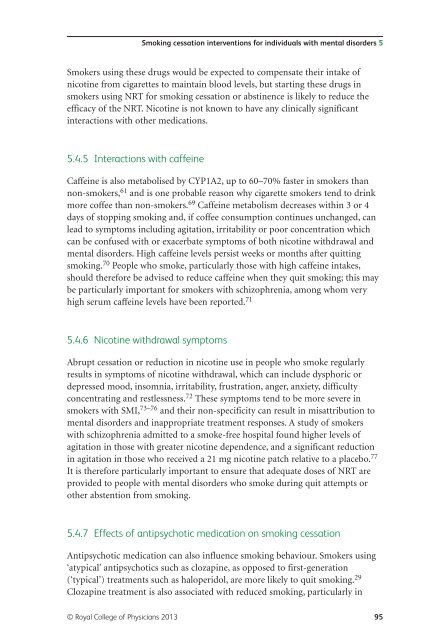Smoking and mental health - NCSCT
Smoking and mental health - NCSCT
Smoking and mental health - NCSCT
Create successful ePaper yourself
Turn your PDF publications into a flip-book with our unique Google optimized e-Paper software.
<strong>Smoking</strong> cessation interventions for individuals with <strong>mental</strong> disorders 5<br />
Smokers using these drugs would be expected to compensate their intake of<br />
nicotine from cigarettes to maintain blood levels, but starting these drugs in<br />
smokers using NRT for smoking cessation or abstinence is likely to reduce the<br />
efficacy of the NRT. Nicotine is not known to have any clinically significant<br />
interactions with other medications.<br />
5.4.5 Interactions with caffeine<br />
Caffeine is also metabolised by CYP1A2, up to 60–70% faster in smokers than<br />
non-smokers, 61 <strong>and</strong> is one probable reason why cigarette smokers tend to drink<br />
more coffee than non-smokers. 69 Caffeine metabolism decreases within 3 or 4<br />
days of stopping smoking <strong>and</strong>, if coffee consumption continues unchanged, can<br />
lead to symptoms including agitation, irritability or poor concentration which<br />
can be confused with or exacerbate symptoms of both nicotine withdrawal <strong>and</strong><br />
<strong>mental</strong> disorders. High caffeine levels persist weeks or months after quitting<br />
smoking. 70 People who smoke, particularly those with high caffeine intakes,<br />
should therefore be advised to reduce caffeine when they quit smoking; this may<br />
be particularly important for smokers with schizophrenia, among whom very<br />
high serum caffeine levels have been reported. 71<br />
5.4.6 Nicotine withdrawal symptoms<br />
Abrupt cessation or reduction in nicotine use in people who smoke regularly<br />
results in symptoms of nicotine withdrawal, which can include dysphoric or<br />
depressed mood, insomnia, irritability, frustration, anger, anxiety, difficulty<br />
concentrating <strong>and</strong> restlessness. 72 These symptoms tend to be more severe in<br />
smokers with SMI, 73–76 <strong>and</strong> their non-specificity can result in misattribution to<br />
<strong>mental</strong> disorders <strong>and</strong> inappropriate treatment responses. A study of smokers<br />
with schizophrenia admitted to a smoke-free hospital found higher levels of<br />
agitation in those with greater nicotine dependence, <strong>and</strong> a significant reduction<br />
in agitation in those who received a 21 mg nicotine patch relative to a placebo. 77<br />
It is therefore particularly important to ensure that adequate doses of NRT are<br />
provided to people with <strong>mental</strong> disorders who smoke during quit attempts or<br />
other abstention from smoking.<br />
5.4.7 Effects of antipsychotic medication on smoking cessation<br />
Antipsychotic medication can also influence smoking behaviour. Smokers using<br />
‘atypical’ antipsychotics such as clozapine, as opposed to first-generation<br />
(‘typical’) treatments such as haloperidol, are more likely to quit smoking. 29<br />
Clozapine treatment is also associated with reduced smoking, particularly in<br />
© Royal College of Physicians 2013 95














